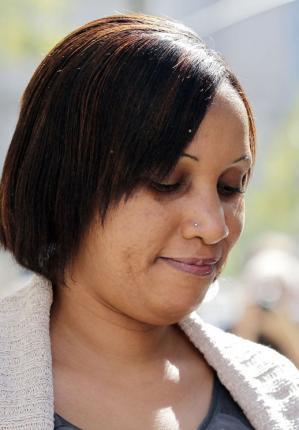View photo

0
1181
All charges against Dominique Strauss-Kahn dismissed
Nafissatou Diallo, the woman who has accused former IMF Chief Dominique Strauss-Kahn of sexual assault, stands while Attorney Kenneth P. Thompson speaks to the media after a meeting with the District Attorney at the 80 Centre Street in New York City on August 8, 2011. Prosecutors in the office of Cyrus R. Vance Jr., the Manhattan district attorney, have filed papers requesting that all charges be dropped against Kahn. UPI/John Angelillo
----
Paris (CNN) -- As the charges against Dominique Strauss-Kahn were about to be dropped in New York, a friend of mine who lives in the Tribeca neighborhood, next to where the Frenchman was under house arrest, casually mentioned that he often saw Strauss-Kahn and his wife Anne Sinclair through a skylight in the roof of the building.
My friend said there was no telling what they were talking about, but on some occasions a yellow legal pad was at hand. Perhaps they were compiling a to-do list.
DSK was no doubt preoccupied with the criminal case against him, now dropped, but a man of his ambition and organizational skills is not the sort to languish, consumed by the present.
He and his wife, journalist Anne Sinclair, have been one of France's power couples since they married in 1989.
Now that he has his passport back, the chattering classes in France are gossiping anew about what his return may mean. Has he been planning a political comeback?
Some of his diehard friends in the Socialist party are heralding his return as if he might just be able to pick up the pieces - and still put himself forward as a presidential candidate. Politicians are forever reinventing themselves, but in DSK's case that appears to be something of a stretch.
Especially in light of a public opinion poll taken after the rape charges were dropped. According to that survey by the polling agency BVA, 80% of French people do not wish to see Strauss-Kahn run for president.
What's more, a poll published by the IFOP group at the weekend indicates that a large majority (61 per cent) of the population don't want to see him having a ministerial role in any future government should the Socialist party win next year's elections.
That is something of a surprise, because while the charges were still pending in New York, the polls on DSK were not nearly so negative.
It is almost as if the French were willing to gather the wagons around one of their own, who, as many saw it, was being persecuted by American prosecutors.
But when that same justice system freed him from prosecution and it looked like he actually could be coming back to rejoin political scene in France, opinions changed toward distaste for an ugly affair that not only humiliated Strauss-Kahn, but many felt harmed the image of the entire nation.
What's more, the Strauss-Kahn affair brought into clear focus facts that were either unknown or ignored by many here. First: Strauss-Kahn and his wife are very rich. The way they assembled the legal team, the $1 million bail, that townhouse in Tribeca -- pretty remarkable for someone who comes from the political left and a party meant to represent the interests of "the people."
Secondly, the DSK case has provoked a real examination here of the role of sex and sexual misconduct in French politics. During the summer of intense coverage of the case, a number of very high-profile women in political and professional life came forward to talk about sexual harassment and abuse that they suffered as they rose through the system.
A junior minister in the government is now facing a criminal trial for alleged sexual crimes because of complaints brought by two subordinates, his fall from power being called "collateral damage" of the DSK affair. And women's groups have been re-energized in their campaigns to bring up for serious public discussion the subject of sexual wrongdoing. Said one feminist: "There is not a country in the civilized world where women put up with the kind of sexual insults French women do."
"L'affaire DSK" has also prompted a re-examination of the role of the press and privacy. Perhaps, some say, the old notion here (in contrast to the U.S.) that the private lives of public figures are nobody's business but their own, needs challenging.
If Strauss-Kahn had a reputation as a philanderer -- even someone suspected of sexual harassment -- perhaps someone should have reported that earlier. DSK still faces embarrassing and possibly damaging legal action being brought by a French journalist Tristane Banon, accusing him of attempted rape in 2003. That case is proving almost as divisive as the charges brought in New York.
All of it tends to argue against any future role for Strauss-Kahn in French politics, and certainly his name will not be on the Socialist party ballot for the presidency when the party holds its primary in October.
But here, like everywhere, memories can be short. A leading news magazine headlined its article on DSK's future "DSK needs to take his time," suggesting there might yet be an alternative to retirement.
And the same pollster that reported the majority of French don't want Strauss-Kahn in a government post, felt obliged to point out that 38% of the French do think he should have ministerial job.
As for my friend with a window on the DSK skylight, he knows he could have made a fortune renting out the view to photographers and journalists, but he is also smart enough to know that practically everyone involved with the DSK affair was tarnished by it.
PUB
Photos From This Album
PUB
Author
KHADHORMEDIA
Le Top des Tops Médias, KHADHOR' MEDIA, C'est Trop Top !
Le Top des Tops Médias, KHADHOR' MEDIA, C'est Trop Top !
Facebook
Recommend
Photo info






